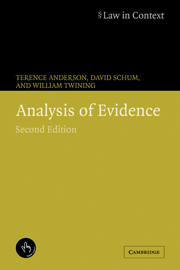Book contents
- Frontmatter
- Contents
- Preface
- Acknowledgments
- Tables of cases and statutes
- Table of legislation and rules
- List of abbreviations
- 1 Evidence and inference: some food for thought
- 2 Fact investigation and the nature of evidence
- 3 Principles of proof
- 4 Methods of analysis
- 5 The chart method
- 6 Outlines, chronologies, and narrative
- 7 Analyzing the decided case: anatomy of a cause célèbre
- 8 Evaluating evidence
- 9 Probabilities, weight, and probative force
- 10 Necessary but dangerous: generalizations and stories in argumentation about facts
- 11 The principles of proof and the law of evidence
- 12 The trial lawyer's standpoint
- Glossary of terms and symbols
- References
- Index
3 - Principles of proof
Published online by Cambridge University Press: 23 November 2009
- Frontmatter
- Contents
- Preface
- Acknowledgments
- Tables of cases and statutes
- Table of legislation and rules
- List of abbreviations
- 1 Evidence and inference: some food for thought
- 2 Fact investigation and the nature of evidence
- 3 Principles of proof
- 4 Methods of analysis
- 5 The chart method
- 6 Outlines, chronologies, and narrative
- 7 Analyzing the decided case: anatomy of a cause célèbre
- 8 Evaluating evidence
- 9 Probabilities, weight, and probative force
- 10 Necessary but dangerous: generalizations and stories in argumentation about facts
- 11 The principles of proof and the law of evidence
- 12 The trial lawyer's standpoint
- Glossary of terms and symbols
- References
- Index
Summary
Introduction: evidence in legal contexts
Within the common law tradition there has been a tendency to equate the subject of evidence with the law of evidence and to marginalize or neglect other dimensions such as the logic of proof, witness psychology, the evidentiary significance of forensic science, and the role of statistics and of narrative in arguing about and deciding contested issues of fact in legal contexts. In Part B, we first describe the shared assumptions upon which evidence scholars have based their work for two centuries – the Rationalist Tradition – and its importance in contemporary practice and then describe and illustrate the principles that form the basis for the logic of proof.
Part C begins with Wigmore's explanation for his view that mastery of the principles of proof is at least as important as mastery of the rules regulating the admissibility and use of evidence. Part D introduces some terminology basic to understanding those principles. The probative processes and logical principles necessary for analyzing evidence and marshaling arguments in legal contexts are presented and developed in Part E.
The Rationalist Tradition
The common law model of adjudication reflects some basic assumptions – assumptions about the nature and proper ends of adjudication, assumptions about the nature of knowledge and the possibility of making accurate present judgments about past events, and assumptions about what is involved in reasoning about disputed questions of fact in forensic contexts. The assumptions underlying contemporary theory and practice, at least as reflected in the writings of those who have specialized in the field of evidence, have persisted with little apparent change since the eighteenth century.
- Type
- Chapter
- Information
- Analysis of Evidence , pp. 78 - 111Publisher: Cambridge University PressPrint publication year: 2005



